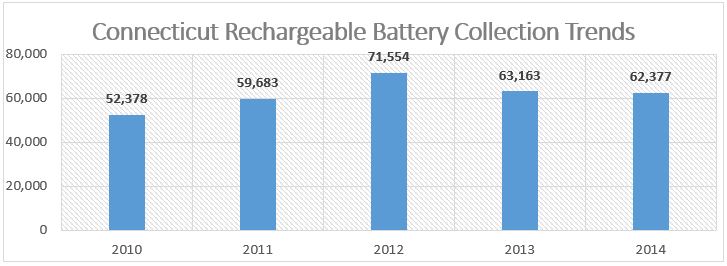Testimony before the Connecticut Environment Committee
By Carl E. Smith, CEO / President, Call2Recycle, Inc.
Raised Bill 6957
March 11, 2015
 Good morning. Thank you for the opportunity to testify before you today regarding this committee’s consideration of battery product stewardship legislation.
Good morning. Thank you for the opportunity to testify before you today regarding this committee’s consideration of battery product stewardship legislation.
My name is Carl Smith and I head the non-profit Call2Recycle, Inc., North America’s oldest and arguably most successful product stewardship organization. We’ve been collecting rechargeable batteries in the US and Canada, including in the state of Connecticut, for 21 years. We were founded by 5 rechargeable battery manufacturers to proactively address the necessity of diverting certain battery chemistries from landfill.
As an illustration, allow me to give you some highlights of our recent experience in the state of Connecticut:
Last year, we collected over 62,000 pounds of rechargeable batteries in the state through over 300 collection sites. Some of our biggest generators of batteries are, among retailers, Lowe’s and The Home Depot, and among municipal districts, Housatonic Resources Recovery Authority (HRRA) and Southeastern CT Regional Resources Recovery Authority (SCRRRA).
In almost all US states, including in Connecticut, we have historically operated a voluntary program –manufacturers have not been required under state or federal law to participate. Yet the program has been free to consumers, retailers, municipalities and any organization that wants to participate as a collection site.
We strongly support Connecticut’s consideration of an all battery product stewardship law. For a successful voluntary program, our reasons may surprise you.
Over the last few years, we’ve concluded that a purely voluntary program like ours cannot survive long-term without state requirements to participate. This not only ensures a level-playing field for the companies that do participate, it also guarantees that we have the money to handle the batteries we collect. We estimate that 30%-40% of what we collect is sold into the market by companies that do not participate in our program.
Why, you might ask, do we need to collect ALL batteries – both rechargeable and primary – when only some batteries potentially contain harmful heavy metals that should be diverted from landfills? Our organization’s mission is to minimize waste and protect the environment, and we achieve this by optimizing battery collections. We don’t divert batteries from landfills solely because of their content. We also collect and recycle to minimize waste, attain a net environmental benefit and preserve the natural resources that are used to manufacture batteries. Finally and most importantly, all data demonstrably show that the most critical way to optimize batteries collections is to collect ALL batteries and not force the consumer to differentiate between rechargeable and primary batteries.
We applaud the committee’s intent to tackle this issue. We are particularly pleased with enforcement provisions in the bill and the fact that it appears to include all batteries. But the bill, as drafted, falls short of what is needed to preserve the long-term financial integrity of our take-back program.
First, the exemptions included in this bill are huge and include medical devices, electronics, and business-to-business uses which almost any steward could claim. These exclusions cover most of the rechargeable batteries sold into the market. The fact is, those batteries will still show up in our collection system. This places a huge financial burden on us and the handful of companies that are participating will end up financing those who are not. This is not, in fact, a comprehensive all-battery bill in its current state. Second, the bill requires mass communication through radio and television. We disagree that mass communication is an effective way for outreach and to educate consumers. We strongly believe in public outreach and education but to be prescriptive by indicating that it must include these forms of communications is cumbersome and needlessly expensive. Third, certain batteries are classified as hazardous waste by the U.S. EPA and hazardous materials by the U.S. DOT and should not be collected curbside or in some “backyard collection” scheme. To avoid safety issues, we insist that all of our collection sites have a responsible person monitoring whatever is placed in our collection kits. The bill encourages what could be a very dangerous practice.
There are also several technical issues with the bill that I would be happy to discuss either in question and answer or in discussions with staff afterwards.
We look forward to working with you in addressing these issues and providing the input necessary to make this a great bill. Thank you for your time and interest in this issue. I am more than happy to address any questions that you might have.
ShareAPR
